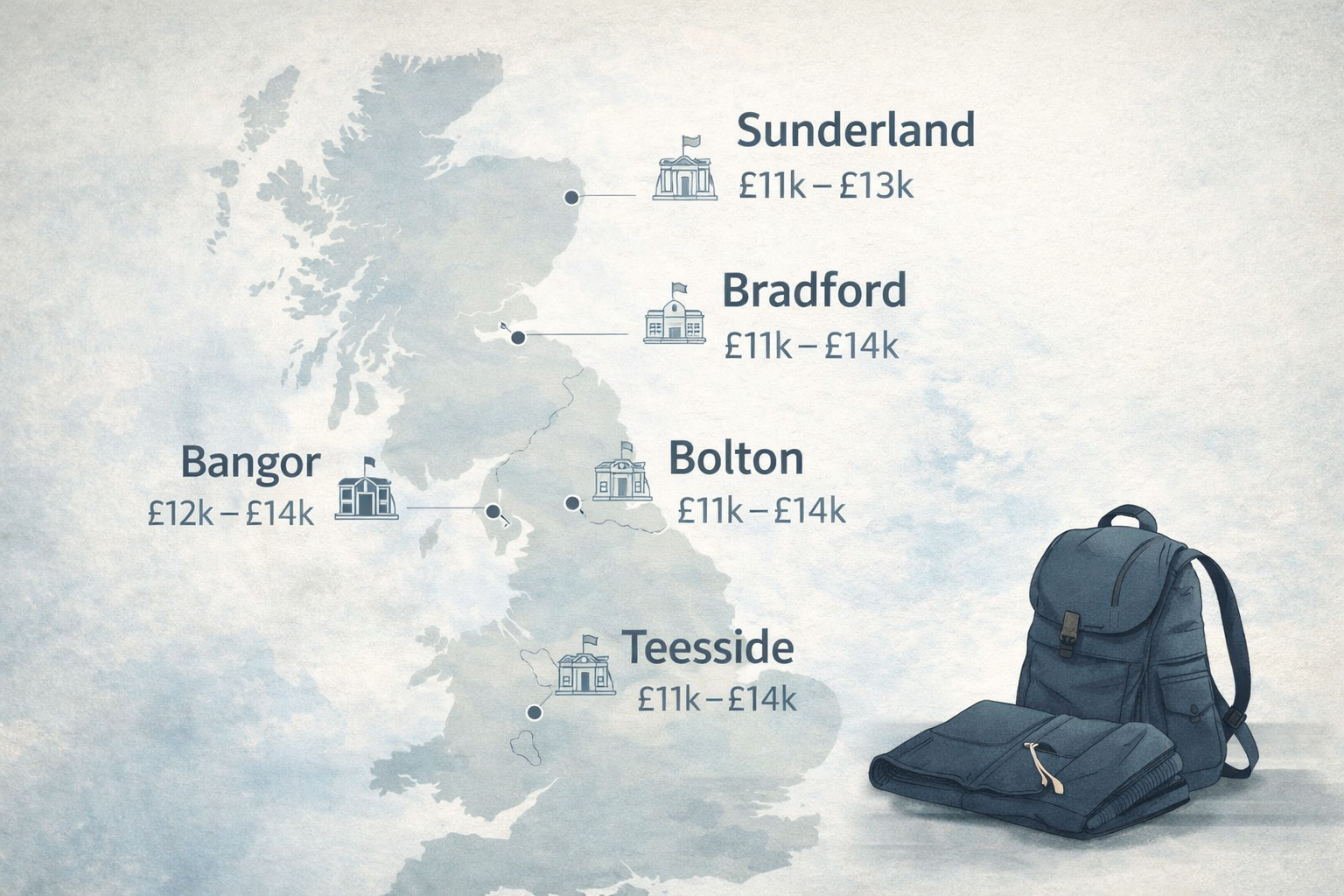Picture this: you’re scrolling through LinkedIn at 2 AM (we’ve all been there), watching former classmates post about their shiny masters program degrees from prestigious British universities. That familiar pang hits – should you be doing something more ambitious with your career?
Here’s the thing about UK masters program that nobody tells you upfront: they’re not just academic exercises. They’re 12-month intensive boot camps for your brain, networking marathons disguised as seminars, and sometimes the most expensive therapy sessions you’ll ever attend. But here’s what else they are – potentially life-changing.
I spent months diving deep into the labyrinth of British higher education, and what I discovered might surprise you. The landscape of UK masters programs in 2025 is more complex, more competitive, and frankly more exciting than ever before. Whether you’re a fresh graduate or someone contemplating a mid-career pivot, the UK’s academic ecosystem offers pathways that simply don’t exist anywhere else.
But let’s be brutally honest – the application process can feel like solving a Rubik’s cube blindfolded while riding a unicycle. That’s where specialized guidance becomes invaluable. Having the right support system can transform this overwhelming journey into a manageable adventure, especially when you’re navigating everything from tailored academic placement to pre-departure orientation.

The Hidden Reality Behind UK Masters Applications
Most people think applying to UK masters programs is straightforward. Fill out forms, send transcripts, write a personal statement – job done, right? Wrong. Spectacularly wrong.
The truth is that UK universities operate on a rolling admissions system for most postgraduate programs, which means the early bird doesn’t just get the worm – they get the entire buffet. Unlike undergraduate applications that funnel through UCAS, masters applications go directly to universities (Top Universities, Prospects), creating a Wild West scenario where timing becomes everything.
Here’s what’s fascinating: most faculty specialisms open for applications around September 15th, with some programs opening as early as October (How to apply for a master’s degree in the UK | Top Universities). But here’s the kicker – just because applications are “open” doesn’t mean you should wait. I’ve seen brilliant candidates miss out on competitive programs simply because they applied in June instead of November.
The reality? Universities recommend applying at least six months before your course begins, especially if your program requires a portfolio, essay, or interview (Masters Degree in UK 2025 for International Students). This isn’t just administrative preference – it’s strategic necessity.
UK Masters Application Timeline
| Application Timeline | Recommended Action | Why It Matters |
|---|---|---|
| September-November | Submit applications for most competitive programs | Rolling admissions favor early applicants |
| December-February | Continue applying, focus on programs with later deadlines | Many spots still available, less competition |
| March-May | Last chance for September entry | Limited spaces, higher rejection rates |
| June-August | Visa applications, accommodation booking | Administrative crunch time |
Money Talks: The Real Cost Equation
Let’s address the elephant in the room – money. Average tuition fees for international students pursuing UK masters programs range from £5,000 to over £30,000 per year, with some disciplines like Business, Engineering, or Computer Science commanding significantly higher fees (FindAMasters.com, Manchester).
But here’s where it gets interesting. The total cost isn’t just tuition. You’re looking at a complex equation that most people drastically underestimate.
Master’s students should budget approximately £1,200 to £1,500 per month for living expenses in London, or £900-£1,300 in other UK cities, covering accommodation, food, transportation, study materials, and personal expenses (British Council, Cambridge). That’s £10,800 to £18,000 annually just for existing.
Then there are the hidden costs nobody mentions: visa applications (£524), Immigration Health Surcharge (£1,035 per year), and the notorious “pre-departure shopping spree” that can easily run into thousands (Fees | Postgraduate Study).
Here’s the deliberately imperfect table showing cost breakdowns (because real life is messy):
Annual Cost Breakdown for UK Masters (International Students)
| Cost Category | London (Annual) | Outside London | Notes |
|---|---|---|---|
| Tuition (International) | £15,000-£35,000 | £12,000-£28,000 | Varies wildly by program |
| Accommodation | £7,200-£12,000 | £4,800-£8,400 | Shared vs private varies |
| Food & Groceries | £2,400-£3,600 | £2,000-£3,000 | Cooking vs eating out makes huge difference |
| Transport | £1,500+ | £600-£1,200 | London transport is £££ |
| Visa & Health Surcharge | £1,559 | £1,559 | One-time (mostly) |
| TOTAL ESTIMATE | £27,659-£55,759 | £20,959-£42,159 | Per year |
Note: These figures are estimates and can vary significantly based on lifestyle choices, program requirements, and exchange rates.
The Scholarship Hunt: More Complex Than You Think
Here’s where most guides get it wrong – they treat scholarships like lottery tickets. The reality of funding UK masters programs is far more nuanced, requiring strategic thinking and comprehensive financial aid support.
The UK government offers three main scholarship programs: GREAT Scholarships, Chevening Scholarships (offering fully funded master’s degrees), and Commonwealth Scholarships. But here’s what’s fascinating – these aren’t just academic merit contests (Scholars4dev, Gov.uk).
Chevening, for instance, isn’t looking for the highest GPA. They want exceptional up-and-coming leaders with strong drive, innovative ideas, and demonstrated leadership qualities, plus at least two years of work experience (Fully Funded Scholarships in UK for International Students: 2025). I’ve seen candidates with perfect grades get rejected while someone with a 3.2 GPA but impressive entrepreneurial experience gets selected.
Gates Cambridge Scholarship provides a £17,500 stipend per annum, health insurance, academic development funding up to £2,000, and family allowance up to £10,120 (Fully Funded Scholarships in UK for International Students: 2025) – but competition is brutal, with acceptance rates hovering around 0.3%.
The secret sauce? University-specific scholarships often have better odds. UCL’s Global Master’s Scholarship offers £15,000 specifically for international students from lower income backgrounds (Top Universities in the UK for a Masters – 2025 | FindAMasters.com), while many institutions offer subject-specific funding that receives fewer applications.
Academic Requirements: Beyond the Obvious
Most people think a good undergraduate degree is enough. It’s not.
Typically, applicants need a relevant undergraduate degree with a minimum grade of 2:1 or equivalent, plus English language proficiency through IELTS or TOEFL (Yocket Study Abroad, Study). But here’s the complexity – “equivalent” varies dramatically between countries and institutions.
I’ve seen American students with 3.0 GPAs get accepted to programs that rejected Indian students with 8.5/10 CGPAs. Why? Grade inflation, degree recognition agreements, and institutional familiarity with educational systems create invisible hierarchies.
The English requirement trap: Most universities require IELTS scores with specific band requirements, but they rarely mention that some programs need higher scores in particular sections (Masters Degree in UK 2025 for International Students). A journalism masters might demand 7.5 in writing specifically, not just overall.
University Selection: The Prestige vs Fit Dilemma
The University of Oxford retains its position as the best university in the UK for the ninth consecutive year, with Cambridge consistently ranking in the top five (FatehIndia). But here’s an uncomfortable truth – prestige doesn’t equal fit.
Imperial College London excels in science and engineering, while the London School of Economics dominates social sciences (Best universities in the UK 2025 – University Rankings). Imperial offers 179 master’s programmes across science, engineering, medicine, and business, with over 3,000 academic and research staff (UK Masters Programs 2025: Which Universities Offer Best Value?).
The London premium question: Should you pay extra to study in the UK capital? The answer isn’t automatic. Imperial’s labs host SpaceX engineers, while LSE’s policy workshops involve Treasury officials, turning lectures into dialogues with sector leaders (UK Masters Programs 2025: Which Universities Offer Best Value?). But Manchester’s research tackles real-world challenges like sustainable cities, while Edinburgh’s informatics graduates shape Silicon Valley (Manchester, Edinburgh).
This is where professional guidance becomes invaluable – understanding which institutions align with your specific career goals rather than chasing rankings alone.
The Application Strategy Matrix
Here’s where comprehensive end-to-end admissions support proves crucial. The unspoken rules of UK admissions can make or break applications, and navigating them requires expertise that most applicants simply don’t possess.
Personal statement evolution: The days of generic “I’m passionate about…” statements are over. Admissions tutors read hundreds of applications. Your statement needs to demonstrate specific knowledge of their program, faculty research, and how you’ll contribute to their academic community.
Reference letter strategy: Most programs require two academic references, but if you’ve been out of education for more than five years, professional references become acceptable (Masters Degree in UK 2025 for International Students). The key? Briefing your referees on specific program requirements and providing them with detailed information about your goals.
Visa Complexity: The Final Hurdle
To get your student visa, you need a Confirmation of Acceptance of Studies (CAS) from your university, which triggers a “pre-CAS check” to ensure all details are correct (How to apply for Masters courses | University of Leeds). This sounds simple but creates timing pressure.
The financial proof challenge: You need to show funds for first-year tuition plus living expenses: £12,006 for London or £9,207 for elsewhere in the United Kingdom, representing 9 months of living costs (How to apply for Masters courses | University of Leeds). But banks often freeze large sums, creating cash flow problems at exactly the wrong moment.
This complexity underscores why pre-departure orientation becomes so valuable – understanding these administrative intricacies before they become problems can save months of stress and potential visa complications.
The Hidden Benefits Nobody Discusses
UK masters programs offer advantages that extend far beyond credentials. The UK’s one-year master’s structure provides faster entry into employment compared to traditional two-year programs elsewhere (How Much Does a Masters Cost in the UK in 2025? Find Out!). Time is money, literally.
The networking multiplier effect: British universities aren’t just educational institutions – they’re networking supernovas. Alumni networks span governments, corporations, and startups globally. That casual conversation over coffee might lead to your next job offer.
Research access: UK universities punch above their weight in research output. As a masters student, you’re not just consuming knowledge – you’re potentially contributing to cutting-edge research that influences policy and industry practice.
Regional Variations: Beyond London’s Shadow
Scotland’s advantage: Scottish universities offer some programs starting at £500-£1,000 per year, with others reaching £17,000+ (UK Masters Fees for International Students in 2025 – A Guide | FindAMasters.com). The variation creates opportunities for budget-conscious students.
Wales and Northern Ireland: Often overlooked, these regions offer excellent programs at significantly lower living costs. Cardiff University consistently ranks among the top institutions, while Queen’s University Belfast provides exceptional value.
Proper tailored academic placement considers these regional advantages, matching students with institutions that offer the best combination of academic quality, affordability, and career outcomes.
Industry Connections: The Practical Advantage
What separates exceptional UK masters programs from mediocre ones isn’t just academic rigor – it’s industry integration. The best programs feature guest lectures from industry leaders, internship placements, and dissertation projects sponsored by companies.
Understanding these connections requires insider knowledge that goes beyond university websites and marketing materials.
The Technology Factor
UK masters programs increasingly emphasize digital skills across all disciplines. Even humanities programs now include data analysis components, while business programs mandate coding competency. This technological integration ensures graduates remain relevant in rapidly evolving job markets.
Post-Graduation Pathways
The Graduate visa allows students to stay in the UK after completing their studies, with application fees of £880 plus Immigration Health Surcharge costs (Fees | Postgraduate Study). This represents a significant opportunity for career development in one of the world’s major economies.
Salary expectations: On average, graduates from UK masters programs can earn up to £58,000 (INR 6,032,000) annually (Master’s Degrees in the United Kingdom (2025 Guide)). But this varies dramatically by field, location, and career trajectory.
Making the Right Choice: Professional Guidance Matters
Choosing to pursue UK masters programs isn’t just an educational decision – it’s a life pivot with implications extending far beyond the 12-month program duration. These three factors academics, exposure to other cultures, and career prospects combine to form value that increases over decades.
So whether you are lured by the historic halls of Oxford, the state-of-the-art labs at Imperial or the futuristic research facilities at Manchester, preparation, careful timing of applications and of aligning goals is the key to success.
For those seeking comprehensive support throughout this journey, GCRD Hub offers the full spectrum of services that can transform this challenging process into a successful outcome. Located at 107-111 Fleet Street, London, they provide tailored academic placement that matches students with programs aligned to their goals, scholarship & financial aid support to maximize funding opportunities, end-to-end admissions support that handles every aspect of the application process, and pre-departure orientation that prepares students for success from day one.
The UK’s higher education landscape continues evolving, but its fundamental strengths – academic excellence, global recognition, and career impact – remain constant. Your masters journey starts with a single application, but its effects last a lifetime.
Frequently Asked Questions
Q: How long does it take to get admission decisions? A: Universities typically take between two weeks and two months to process applications (Masters Degree in UK 2025 for International Students), but this varies by program popularity and application completeness.
Q: Can I work while studying? A: Student visa holders can typically work up to 20 hours per week during term time and full-time during holidays, but this depends on your specific visa conditions.
Q: What’s the difference between taught and research masters? A: Taught masters involve scheduled modules like lectures and seminars, while research masters focus on independent work and projects, serving as preparation for potential PhD study (How to apply for Masters courses | University of Leeds).
Q: Are scholarships available for all programs? A: While scholarship availability varies, postgraduate scholarships are more common than undergraduate ones, with various options from government, university, and third-party sources (UK Scholarships for International Students 2025-2026 | Scholars4Dev).
Q: Should I choose London universities? A: London offers unparalleled networking and cultural opportunities but comes with significantly higher living costs. Consider your career goals, budget, and personal preferences.
Q: What happens if I don’t meet entry requirements? A: You can usually still apply if you’re completing qualifications, potentially receiving conditional offers that depend on meeting requirements before course start (How to apply for a Masters course : Masters : Study with us : University of Sussex).
Q: How important are rankings? A: Rankings matter for certain career paths and employers, but program fit, location, and personal goals should weigh heavily in your decision.
Q: When should I start my application process? A: Begin researching programs at least 8-12 months before your intended start date, with applications submitted 6-9 months in advance for the best chances.
Q: Do I need work experience for all masters programs? A: Certain programs, especially in business or sciences, may require relevant work experience in addition to academic qualifications (UK Masters Requirements: Know the Requirements to Apply for Masters Degree in UK), but this varies by discipline and university.
Q: What support is available for international students? A: UK universities offer comprehensive support including orientation programs, academic support, career services, and dedicated international student offices to help with visa and practical matters.
Ready to begin your UK masters journey? Contact GCRD Hub at +44 7756 428968 for personalized guidance that covers every aspect of your application journey – from identifying the perfect program match to securing funding and preparing for life in the UK.





